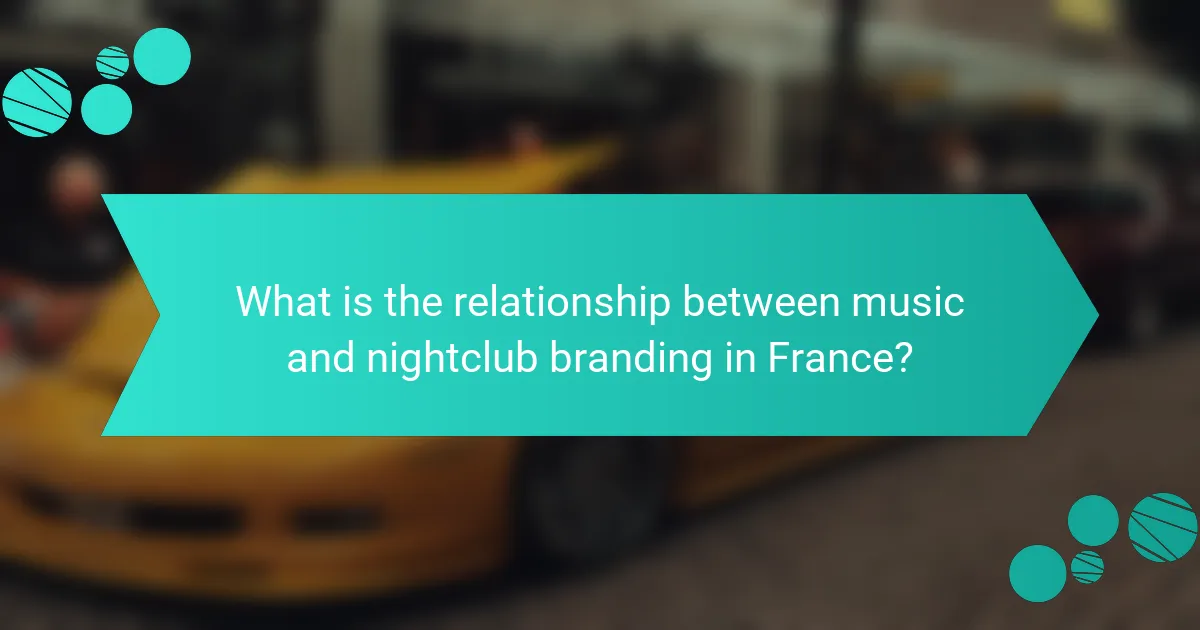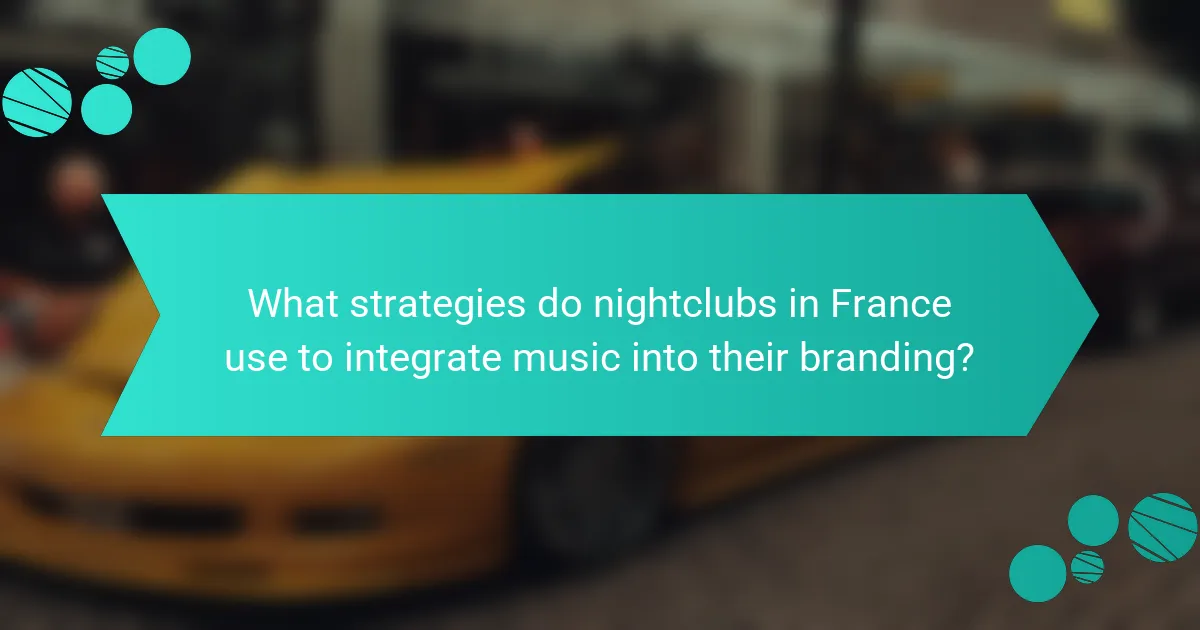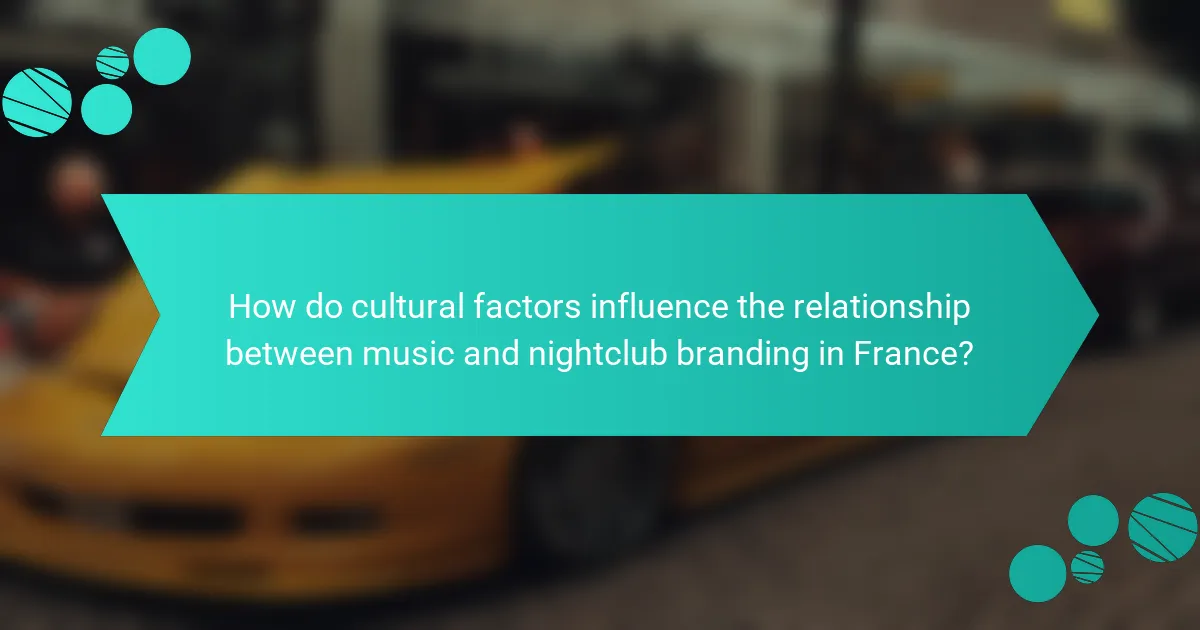Music is a fundamental element of nightclub branding in France, significantly shaping the atmosphere and identity of these venues. Different music genres attract specific demographics; for example, electronic music typically draws younger audiences, while jazz clubs cater to a more mature crowd. Nightclubs implement various branding strategies, such as curating music that aligns with local tastes and hosting themed events, which enhance customer experience and loyalty. Cultural factors also play a vital role, as they influence music selection and programming, fostering a sense of community and connection among patrons. Ultimately, the strategic integration of music into branding is essential for nightclubs to maintain relevance and competitiveness in the market.

What is the relationship between music and nightclub branding in France?
Music plays a crucial role in nightclub branding in France. It shapes the atmosphere and identity of nightclubs. Different genres attract specific audiences. For instance, electronic music venues often target younger crowds. In contrast, jazz clubs may appeal to a more mature demographic. Branding strategies often incorporate popular music trends. This alignment enhances customer experience and loyalty. Research indicates that music influences customer behavior significantly. A study by North and Hargreaves found that the right music can increase spending in venues. Thus, music is integral to effective nightclub branding in France.
How does music influence the branding of nightclubs in France?
Music significantly influences the branding of nightclubs in France. It shapes the atmosphere and identity of the venue. Different genres attract specific demographics. For example, electronic music clubs often appeal to younger audiences. The choice of music can enhance the overall experience. It creates emotional connections with patrons. This connection encourages customer loyalty and repeat visits. Research shows that music can increase the time spent in a venue. A study by North and Hargreaves indicated that background music affects consumer behavior in bars and nightclubs. Therefore, music is a crucial element in the branding strategy of French nightclubs.
What are the key elements of music that affect nightclub branding?
The key elements of music that affect nightclub branding include genre, tempo, and lyrical content. Genre shapes the overall atmosphere and target audience of a nightclub. For instance, electronic dance music is often associated with vibrant, energetic environments. Tempo influences the pace of the night and can affect patrons’ energy levels. A faster tempo typically encourages more dancing and excitement. Lyrical content can convey themes that resonate with the club’s identity and clientele. For example, lyrics focused on celebration and nightlife enhance a club’s branding as a fun destination. Additionally, live performances and DJ sets can create unique experiences that differentiate a nightclub from competitors. These elements collectively contribute to a nightclub’s branding by establishing a consistent auditory identity that attracts and retains customers.
How do different music genres shape the identity of nightclubs?
Different music genres significantly shape the identity of nightclubs. Each genre attracts distinct audiences and creates unique atmospheres. For example, techno clubs often emphasize minimalism and industrial aesthetics. This aligns with the genre’s roots in underground culture. In contrast, hip-hop venues frequently showcase vibrant decor and urban art. This reflects the genre’s connection to street culture and community. Additionally, house music clubs focus on inclusivity and celebration, fostering a sense of belonging. The choice of music genre influences branding, marketing, and overall guest experience. Research indicates that consumers associate specific genres with particular lifestyle choices. This association further solidifies the nightclub’s identity within the competitive market.
Why is nightclub branding important in the French music scene?
Nightclub branding is crucial in the French music scene because it establishes identity and attracts specific audiences. A strong brand differentiates a venue from competitors. It communicates the club’s music style, atmosphere, and overall experience. For instance, iconic clubs like Le Bataclan and Rex Club are recognized for their unique branding. This recognition fosters loyalty among patrons and artists. Additionally, effective branding can enhance marketing efforts through social media and events. Clubs with clear branding often see increased attendance and partnerships with artists. Ultimately, branding shapes the cultural landscape of the French nightlife and music industry.
What role does branding play in attracting customers to nightclubs?
Branding plays a crucial role in attracting customers to nightclubs. It creates a unique identity that distinguishes a nightclub from competitors. Effective branding communicates the club’s atmosphere, music style, and target audience. This helps potential customers identify whether the venue aligns with their preferences. For instance, a nightclub known for electronic music may attract a different crowd than one specializing in live jazz. Research indicates that strong branding can increase customer loyalty and word-of-mouth referrals. A study by the Journal of Marketing found that 77% of consumers make purchases based on brand names. Therefore, branding significantly influences customer attraction and retention in the nightclub industry.
How does effective branding enhance the overall nightclub experience?
Effective branding enhances the overall nightclub experience by creating a unique identity that attracts patrons. A strong brand communicates the nightclub’s values and atmosphere. This helps customers form emotional connections with the venue. Effective branding also influences customer expectations regarding service and ambiance. For instance, a well-branded nightclub can set trends in music and décor. This differentiation can lead to increased customer loyalty and repeat visits. Research shows that 77% of consumers make purchases based on brand identity. In the competitive nightlife industry, branding can significantly impact customer choice and satisfaction.

What strategies do nightclubs in France use to integrate music into their branding?
Nightclubs in France use several strategies to integrate music into their branding. They often curate specific music genres that align with their target audience’s preferences. This creates a unique atmosphere that attracts a dedicated clientele. Collaborations with popular DJs and artists enhance their brand visibility. Many nightclubs also host themed music nights to create memorable experiences. Social media campaigns featuring music clips help in promoting their events. Additionally, partnerships with music festivals increase their brand recognition. The use of innovative sound systems elevates the overall experience for patrons. Collectively, these strategies reinforce the nightclub’s identity and appeal in a competitive market.
How do nightclubs select music to align with their brand identity?
Nightclubs select music to align with their brand identity by curating playlists that reflect their target audience and overall theme. They analyze demographic data to understand the preferences of their clientele. This includes considering age, cultural background, and musical tastes. Nightclubs often collaborate with DJs who resonate with their brand image. The chosen music genres create an atmosphere that enhances the club’s identity. For example, a high-energy club may favor electronic dance music. In contrast, a lounge may opt for softer, more ambient sounds. Research indicates that music significantly influences customer experience and retention. A study by North et al. (2016) found that congruence between music and brand image improves customer satisfaction. Thus, music selection is a strategic decision in nightclub branding.
What factors influence the choice of music genres in nightclub branding?
The choice of music genres in nightclub branding is influenced by target audience preferences. Nightclubs aim to attract specific demographics, such as age groups or cultural backgrounds. The music genre must resonate with the desires and tastes of these groups. Additionally, the nightclub’s location plays a significant role. Urban areas may favor electronic or hip-hop, while suburban venues might lean towards pop or rock. Branding strategy also affects music selection. A luxury brand may opt for sophisticated genres like jazz or lounge. Competitor analysis is another factor. Nightclubs often differentiate themselves by choosing unique music styles not found in nearby venues. Lastly, trends and cultural movements can shift music genre popularity. Keeping up with these trends ensures relevance in the ever-evolving nightlife scene.
How do live performances and DJs contribute to nightclub branding?
Live performances and DJs significantly enhance nightclub branding by creating unique experiences. These experiences attract diverse audiences and foster customer loyalty. DJs often embody the club’s identity, influencing its musical style and atmosphere. Live performances generate excitement and can differentiate a nightclub from competitors. They contribute to the club’s reputation, making it a destination for music lovers. According to a study by the Night Time Industries Association, 70% of club-goers choose venues based on the quality of music and performances. This data underscores the importance of live entertainment in shaping brand perception.
What is the impact of music branding on customer loyalty in nightclubs?
Music branding significantly enhances customer loyalty in nightclubs. It creates a unique identity that resonates with patrons. This identity fosters emotional connections between customers and the venue. Research shows that 70% of consumers prefer brands with strong music associations. Nightclubs using consistent music branding report higher repeat visitation rates. For instance, venues that curate playlists aligning with their brand image see a 30% increase in customer retention. Music branding also influences customer perceptions of quality and atmosphere. A well-defined musical theme can attract a loyal customer base seeking specific experiences. Thus, effective music branding is essential for building lasting customer loyalty in nightclubs.
How does a consistent music theme affect repeat visits to nightclubs?
A consistent music theme significantly enhances repeat visits to nightclubs. This consistency creates a recognizable brand identity. Patrons develop expectations based on their previous experiences. Familiarity with the music encourages emotional connections. Emotional connections lead to increased loyalty among club-goers. Research indicates that 70% of customers prefer venues with a consistent music style. This preference translates into higher attendance rates. Nightclubs that maintain a cohesive musical theme often report better customer retention.
What emotional connections do customers form with music branding?
Customers form strong emotional connections with music branding by associating specific sounds with their experiences. Music evokes memories and feelings that enhance brand loyalty. For instance, a nightclub’s unique playlist can create a sense of belonging among patrons. This emotional resonance often leads to repeat visits and positive word-of-mouth. Research indicates that 61% of customers feel more connected to a brand when music is involved. Additionally, familiar tunes can trigger nostalgia, further deepening the emotional bond. Music branding effectively shapes customer perceptions and influences their overall experience.

How do cultural factors influence the relationship between music and nightclub branding in France?
Cultural factors significantly influence the relationship between music and nightclub branding in France. French culture values diversity in music, leading nightclubs to curate specific genres that reflect local tastes. This approach helps establish a unique brand identity that resonates with their target audience. For instance, Parisian nightclubs often feature electronic music, aligning with the city’s reputation as a hub for this genre. Additionally, cultural events like Bastille Day or the Fête de la Musique impact programming, drawing crowds and enhancing brand visibility. Nightclubs that incorporate local music styles can foster a sense of community and loyalty among patrons. This connection is evident in the popularity of venues that celebrate regional artists. Overall, cultural factors shape branding strategies, ensuring that nightclubs remain relevant and appealing in a competitive market.
What cultural trends are reflected in the music choices of French nightclubs?
French nightclubs reflect cultural trends such as diversity, nostalgia, and electronic music dominance. The music choices often showcase a blend of genres, including house, techno, and hip-hop. This variety mirrors France’s multicultural society. Nostalgia is evident in the revival of classic French chansons and disco tracks. Electronic music, particularly house and techno, has become a defining feature of the French nightlife scene. Events like the annual Techno Parade highlight this trend. Additionally, the influence of global music trends can be seen in the integration of Afrobeat and Latin rhythms. Such choices cater to a broad audience, enhancing the clubbing experience.
How does the history of music in France shape contemporary nightclub branding?
The history of music in France significantly influences contemporary nightclub branding. French music has evolved through various genres, including chanson, electronic, and house. Iconic movements, such as the Parisian jazz scene of the 1920s, established a vibrant nightlife culture. This cultural backdrop informs the aesthetic and thematic choices of modern nightclubs. Nightclubs often reflect historical music styles in their branding, creating a sense of authenticity. Additionally, the legacy of influential French artists shapes the musical offerings in these venues. For example, the rise of house music in the 1980s has led to branding that emphasizes electronic music. This historical context allows nightclubs to connect with audiences on a deeper level. Overall, the interplay between France’s musical heritage and nightclub branding remains a crucial aspect of the nightlife experience.
What challenges do nightclubs face in maintaining their music brand identity?
Nightclubs face several challenges in maintaining their music brand identity. One challenge is the rapidly changing music trends. Nightclubs must constantly adapt to new genres and styles to stay relevant. This can dilute their original brand identity.
Another challenge is competition from other venues. Many nightclubs offer similar music experiences. This makes it difficult for a single club to stand out.
Additionally, the rise of digital music platforms affects nightclub branding. Many patrons prefer listening to music at home. This can reduce foot traffic to nightclubs.
Furthermore, inconsistent music programming can confuse customers. If a nightclub frequently changes its music style, it may lose its loyal audience.
Lastly, partnerships with DJs and artists can be risky. A poorly received performance can negatively impact the club’s brand.
These factors illustrate the complexities nightclubs face in preserving their music brand identity.
How can nightclubs adapt their music branding to changing trends?
Nightclubs can adapt their music branding to changing trends by regularly updating their playlists and collaborating with emerging artists. This ensures they remain relevant to their target audience. Monitoring social media and streaming platforms helps identify popular genres and tracks. Incorporating feedback from patrons can also guide music selection. Hosting themed nights that reflect current musical trends attracts diverse crowds. Utilizing data analytics to track attendance and preferences informs future music choices. Adapting to seasonal trends and cultural events keeps the branding fresh and engaging. Nightclubs that innovate their music offerings can enhance customer loyalty and increase foot traffic.
What strategies can nightclubs employ to overcome branding challenges?
Nightclubs can employ several strategies to overcome branding challenges. First, they should define a unique brand identity that resonates with their target audience. This includes creating a memorable name, logo, and theme that reflects the club’s atmosphere.
Second, nightclubs can leverage social media platforms for effective marketing. Engaging content and regular updates can build a loyal online community.
Third, partnerships with local artists and DJs can enhance credibility and attract diverse crowds. Collaborating with influencers can also amplify reach and visibility.
Fourth, offering exclusive events or themed nights can differentiate the nightclub from competitors. Unique experiences can foster customer loyalty and word-of-mouth promotion.
Fifth, maintaining high-quality customer service is crucial for positive brand perception. Satisfied customers are more likely to return and recommend the venue.
Lastly, gathering and analyzing customer feedback can help nightclubs adapt their branding strategies. Understanding audience preferences allows for continuous improvement and relevance in a competitive market.
What best practices can nightclubs follow for effective music branding?
Nightclubs can follow several best practices for effective music branding. First, they should create a unique music identity that aligns with their brand values. This identity helps distinguish the nightclub in a competitive market. Second, nightclubs should curate playlists that reflect their target audience’s preferences. Research shows that 70% of customers associate music with their overall experience. Third, collaborating with local and renowned DJs can enhance credibility and attract diverse crowds. Additionally, utilizing social media to share music-related content can engage audiences and promote events. Offering exclusive music events or themed nights can also strengthen brand loyalty. Finally, gathering feedback on music choices can help nightclubs adapt and refine their branding strategy.
How can nightclubs measure the success of their music branding efforts?
Nightclubs can measure the success of their music branding efforts through various metrics. Key performance indicators include customer attendance rates. Increased foot traffic often indicates effective music branding. Another metric is customer feedback and satisfaction surveys. Positive responses to music selection reflect successful branding. Social media engagement also serves as a measure. Higher interaction rates on music-related posts show brand resonance. Additionally, sales data can provide insights. Increased beverage and ticket sales during specific music events indicate successful branding. Lastly, partnerships with artists and labels can be evaluated. Successful collaborations often enhance brand reputation and visibility.
What innovative approaches can enhance music branding in nightclubs?
Utilizing technology such as augmented reality can enhance music branding in nightclubs. Augmented reality provides immersive experiences that engage patrons. This technology can be used for interactive visuals synchronized with music. Additionally, collaborating with local artists for exclusive tracks can create a unique sound identity. This approach fosters a sense of community and loyalty among patrons. Social media integration is vital for enhancing music branding. Live-streaming events and behind-the-scenes content can increase engagement and reach. Implementing personalized playlists based on customer preferences can also strengthen brand identity. Data-driven insights from customer interactions can guide music selection and branding strategies effectively.
The primary entity of this article is the relationship between music and nightclub branding in France. The article explores how music shapes the atmosphere and identity of nightclubs, influencing customer demographics and behaviors. It discusses key elements such as genre, tempo, and lyrical content that affect branding, as well as the importance of effective branding in attracting and retaining customers. Additionally, it examines cultural factors, challenges faced by nightclubs, and strategies for adapting music branding to changing trends, ultimately highlighting the significance of music in enhancing the overall nightclub experience.